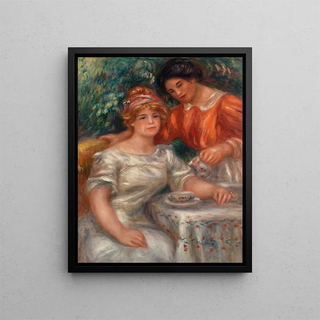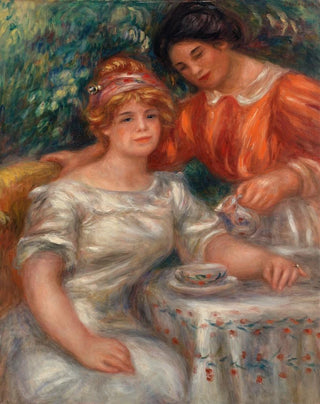Art print | L'heure du thé - Pierre-Auguste Renoir


View from behind

Frame (optional)
In the fascinating world of Impressionism, "L'heure du thé" by Pierre-Auguste Renoir stands out for its intimate atmosphere and delicate depiction of everyday moments. This artwork, painted in 1880, evokes a warm scene where female figures gather around a table, enjoying the conviviality of a sunny afternoon. The piece captures not only light and colors but also the essence of a time when simple pleasures were celebrated. Through this art print, viewers are invited to immerse themselves in a suspended moment, to feel the softness of the instant, and to appreciate the beauty of human interactions.
Style and uniqueness of the work
Renoir's style, characterized by fluid brushstrokes and a vibrant palette, is fully expressed in "L'heure du thé." Warm hues and play of light give the scene a radiant brightness, while the faces of the characters, delicately modeled, convey contagious joy of life. Renoir excels at capturing textures, whether the softness of fabrics or the shine of porcelain, creating a harmonious composition where each element contributes to the whole. The artist does not merely depict a scene; he makes it a celebration of life, where movement and emotion intertwine. This artwork perfectly illustrates Renoir's ability to transform an ordinary moment into an unforgettable aesthetic experience.
The artist and his influence
Pierre-Auguste Renoir, an iconic figure of Impressionism, left a lasting mark on his era with his unique vision of art. Born in 1841, he developed in a vibrant artistic environment where academic conventions were challenged. Renoir, along with his contemporaries, explored new ways of seeing and representing the world, emphasizing light, color, and movement. His influence extends far beyond his time, inspiring generations of artists to embrace a freer, more expressive approach. "L'heure du thé" reflects this quest for beauty and harmony, while offering a glimpse into the social interactions of his period.

Matte finish

View from behind

Frame (optional)
In the fascinating world of Impressionism, "L'heure du thé" by Pierre-Auguste Renoir stands out for its intimate atmosphere and delicate depiction of everyday moments. This artwork, painted in 1880, evokes a warm scene where female figures gather around a table, enjoying the conviviality of a sunny afternoon. The piece captures not only light and colors but also the essence of a time when simple pleasures were celebrated. Through this art print, viewers are invited to immerse themselves in a suspended moment, to feel the softness of the instant, and to appreciate the beauty of human interactions.
Style and uniqueness of the work
Renoir's style, characterized by fluid brushstrokes and a vibrant palette, is fully expressed in "L'heure du thé." Warm hues and play of light give the scene a radiant brightness, while the faces of the characters, delicately modeled, convey contagious joy of life. Renoir excels at capturing textures, whether the softness of fabrics or the shine of porcelain, creating a harmonious composition where each element contributes to the whole. The artist does not merely depict a scene; he makes it a celebration of life, where movement and emotion intertwine. This artwork perfectly illustrates Renoir's ability to transform an ordinary moment into an unforgettable aesthetic experience.
The artist and his influence
Pierre-Auguste Renoir, an iconic figure of Impressionism, left a lasting mark on his era with his unique vision of art. Born in 1841, he developed in a vibrant artistic environment where academic conventions were challenged. Renoir, along with his contemporaries, explored new ways of seeing and representing the world, emphasizing light, color, and movement. His influence extends far beyond his time, inspiring generations of artists to embrace a freer, more expressive approach. "L'heure du thé" reflects this quest for beauty and harmony, while offering a glimpse into the social interactions of his period.






